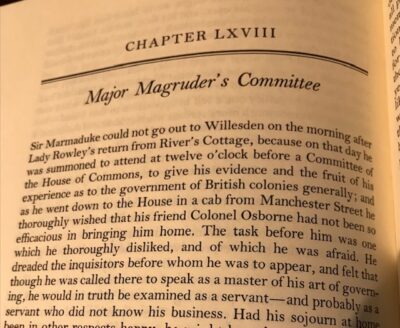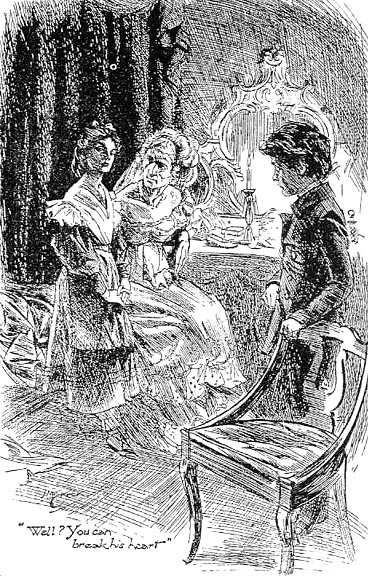How politics work. Anthony Trollope’s 19th century books are the best guide to Westminster that exists today. They are also a great guide to British humour.
Trollope is, perhaps, my favourite novelist (although PG Wodehouse is up there).
How politics work: Trollope is the best guide to British politics
I have described before 11 life-changing reasons you should read Trollope, including his views on religion, sexual politics, and the media (links in bold italics are to other posts on this site).
Trollope is also, arguably, the best guide to how politics work today, even if his books were all written 150 years ago.
But not everyone is convinced.
So I thought I would give an example of the brilliance of Trollope by quoting an entire chapter from his dark 1869 novel He Knew He Was Right, of which I’ve written a complete review, with quotes, here.
He Knew He Was Right
He Knew He Was Right deals with the breakdown of the marriage between Louis Trevelyan, a wealthy young Englishman, and his wife Emily. As a description of how jealousy and stubbornness can destroy a relationship, it is entirely up to date.
How politics work: “He Knew He Was Right”
Emily’s father is Sir Marmaduke Rowley, Governor of the fictional Mandarin Islands, a distant British colony. An old friend, Colonel Osborne, who is also Emily’s godfather, arranges for Sir Marmaduke to be summoned back to London, ostensibly to appear before a parliamentary committee, but in fact in order that Sir Marmaduke can return to London at the taxpayer’s expense to see Emily. Sir Marmaduke acquiesces in this subterfuge; yet is dismayed when he is summoned before the committee of Members of Parliament, which is chaired by one Major Magruder: “a certain ancient pundit of the constitution, who had been for many years a member, and who had been known as a stern critic of our colonial modes of government”.
Trollope explains how politics work
I have reproduced here Chapter 68 of “He Knew He Was Right”, giving an account of Sir Marmaduke’s appearance before the Major Magruder’s committee. I often counsel people who want to understand how politics work and especially British politics, to read Trollope. Chapter 68 (out of 99 in the book) illustrates why how politics work never changes. The procedures described; the emotions of the elderly Sir Marmaduke as he is questioned; the chairmanship and motivation of Major Magruder; and the outcome of the hearing, including the way Sir Marmaduke is treated compared with the incomparably more competent “Governor from one of the greater colonies” who has also been questioned by the committee, could describe the proceedings of a British parliamentary committee in the 21st Century.
Read, and relish. I hope you enjoy it.
How politics work: Anthony Trollope explains
Major Magruder’s Committee
Sir Marmaduke could not go out to Willesden on the morning after Lady Rowley’s return from River’s Cottage, because on that day he was summoned to attend at twelve o’clock before a Committee of the House of Commons, to give his evidence and, the fruit of his experience as to the government of British colonies generally; and as he went down to the House in a cab from Manchester Street he thoroughly wished that his friend Colonel Osborne had not been so efficacious in bringing him home. The task before him was one which he thoroughly disliked, and of which he was afraid.
He dreaded the inquisitors before whom he was to appear, and felt that though he was called there to speak as a master of his art of governing, he would in truth be examined as a servant, and probably as a servant who did not know his business. Had his sojourn at home been in other respects happy, he might have been able to balance the advantage against the inquiry, but there was no such balancing for him now. And, moreover, the expense of his own house in Manchester Street was so large that this journey, in a pecuniary point of view, would be of but little service to him. So he went down to the House in an unhappy mood; and when he shook hands in one of the passages with his friend Osborne who was on the Committee, there was very little cordiality in his manner. ‘This is the most ungrateful thing I ever knew,’ said the Colonel to himself; ‘I have almost disgraced myself by having this fellow brought home; and now he quarrels with me because that idiot, his son-in-law, has quarrelled with his wife.’ And Colonel Osborne really did feel that he was a martyr to the ingratitude of his friend.
The Committee had been convoked by the House in compliance with the eager desires of a certain ancient pundit of the constitution, who had been for many years a member, and who had been known as a stern critic of our colonial modes of government. To him it certainly seemed that everything that was, was bad as regarded our national dependencies. But this is so usually the state of mind of all parliamentary critics, it is so much a matter of course that the members who take up the army or the navy, guns, India, our relations with Spain, or workhouse management, should find everything to be bad, rotten, and dishonest, that the wrath of the member for Killicrankie against colonial peculation and idleness, was not thought much of in the open House. He had been at the work for years, and the Colonial Office were so used to it that they rather liked him. He had made himself free of the office, and the clerks were always glad to see him. It was understood that he said bitter things in the House — that was Major Magruder’s line of business; but he could be quite pleasant when he was asking questions of a private secretary, or telling the news of the day to a senior clerk. As he was now between seventy and eighty, and had been at the work for at least twenty years, most of those concerned had allowed themselves to think that he would ride his hobby harmlessly to the day of his parliamentary death. But the drop from a house corner will hollow a stone by its constancy, and Major Magruder at last persuaded the House to grant him a Committee of Inquiry. Then there came to be serious faces at the Colonial Office, and all the little pleasantries of a friendly opposition were at an end. It was felt that the battle must now become a real fight, and Secretary and Under-Secretary girded up their loins.
Major Magruder was chairman of his own committee, and being a man of a laborious turn of mind, much given to blue-books, very patient, thoroughly conversant with the House, and imbued with a strong belief in the efficacy of parliamentary questionings to carry a point, if not to elicit a fact, had a happy time of it during this session. He was a man who always attended the House from 4 p.m. to the time of its breaking up, and who never missed a division. The slight additional task of sitting four hours in a committee-room three days a week, was only a delight, the more especially as during those four hours he could occupy the post of Chairman. Those who knew Major Magruder well did not doubt but that the Committee would sit for many weeks, and that the whole theory of colonial government, or rather of imperial control supervising such government, would be tested to the very utmost. Men who had heard the old Major maunder on for years past on his pet subject, hardly knew how much vitality would be found in him when his maundering had succeeded in giving him a committee.
A Governor from one of the greater colonies had already been under question for nearly a week, and was generally thought to have come out of the fire unscathed by the flames of the Major’s criticism. This Governor had been a picked man, and he had made it appear that the control of Downing Street was never more harsh and seldom less refreshing and beautifying than a spring shower in April. No other lands under the sun were so blest, in the way of government, as were the colonies with which he had been acquainted; and, as a natural consequence, their devotion and loyalty to the mother country were quite a passion with them. Now the Major had been long of a mind that one or two colonies had better simply be given up to other nations, which were more fully able to look after them than was England, and that three or four more should be allowed to go clear, costing England nothing, and owing England nothing. But the well-chosen Governor who had now been before the Committee, had rather staggered the Major, and things altogether were supposed to be looking up for the Colonial Office.
And now had come the day of Sir Marmaduke’s martyrdom. He was first requested, with most urbane politeness, to explain the exact nature of the government which he exercised in the Mandarins. Now it certainly was the case that the manner in which the legislative and executive authorities were intermingled in the affairs of these islands, did create a complication which it was difficult for any man to understand, and very difficult indeed for a man to explain to others. There was a Court of Chancery, so called, which Sir Marmaduke described as a little parliament. When he was asked whether the court exercised legislative or executive functions, he said at first that it exercised both, and then that it exercised neither. He knew that it consisted of nine men, of whom five were appointed by the colony and four by the Crown. Yet he declared that the Crown had the control of the court, which, in fact, was true enough no doubt, as the five open members were not perhaps, all of them, immaculate patriots; but on this matter poor Sir Marmaduke was very obscure. When asked who exercised the patronage of the Crown in nominating the four members, he declared that the four members exercised it themselves. Did he appoint them? No he never appointed anybody himself. He consulted the Court of Chancery for everything. At last it came out that the chief justice of the islands, and three other officers, always sat in the court, but whether it was required by the constitution of the islands that this should be so, Sir Marmaduke did not know. It had worked well; that is to say, everybody had complained of it, but he, Sir Marmaduke, would not recommend any change. What he thought best was that the Colonial Secretary should send out his orders, and that the people in the colonies should mind their business and grow coffee. When asked what would be the effect upon the islands, under his scheme of government, if an incoming Colonial Secretary should change the policy of his predecessor, he said that he didn’t think it would matter much if the people did not know anything about it.
In this way the Major had a field day, and poor Sir Marmaduke was much discomfited. There was present on the Committee a young Parliamentary Under-Secretary, who with much attention had studied the subject of the Court of Chancery in the Mandarins, and who had acknowledged to his superiors in the office that it certainly was of all legislative assemblies the most awkward and complicated. He did what he could, by questions judiciously put, to pull Sir Marmaduke through his difficulties; but the unfortunate Governor had more than once lost his temper in answering the chairman; and in his heavy confusion was past the power of any Under-Secretary, let him be ever so clever, to pull him through. Colonel Osborne sat by the while and asked no questions. He had been put on the Committee as a respectable dummy; but there was not a member sitting there who did not know that Sir Marmaduke had been brought home as his friend; and some of them, no doubt, had whispered that this bringing home of Sir Marmaduke was part of the payment made by the Colonel for the smiles of the Governor’s daughter. But no one alluded openly to the inefficiency of the evidence given. No one asked why a Governor so incompetent had been sent to them. No one suggested that a job had been done. There are certain things of which opposition members of Parliament complain loudly, and there are certain other things as to which they are silent. The line between these things is well known; and should an ill-conditioned, a pig-headed, an underbred, or an ignorant member not understand this line and transgress it, by asking questions which should not be asked, he is soon put down from the Treasury bench, to the great delight of the whole House.
Sir Marmaduke, after having been questioned for an entire afternoon, left the House with extreme disgust. He was so convinced of his own failure, that he felt that his career as a Colonial Governor must be over. Surely they would never let him go back to his islands after such an exposition as he had made of his own ignorance. He hurried off into a cab, and was ashamed to be seen of men. But the members of the Committee thought little or nothing about it. The Major, and those who sided with him, had been anxious to entrap their witness into contradictions and absurdities, for the furtherance of their own object; and for the furtherance of theirs, the Under-Secretary from the Office and the supporters of Government had endeavoured to defend their man. But, when the affair was over, if no special admiration had been elicited for Sir Marmaduke, neither was there expressed any special reprobation. The Major carried on his Committee over six weeks, and succeeded in having his blue-book printed; but, as a matter of course, nothing further came of it; and the Court of Chancery in the Mandarin Islands still continues to hold its own, and to do its work, in spite of the absurdities displayed in its construction. Major Magruder has had his day of success, and now feels that Othello’s occupation is gone. He goes no more to the Colonial Office, lives among his friends on the memories of his Committee, not always to their gratification, and is beginning to think that as his work is done, he may as well resign Killicrankie to some younger politician. Poor Sir Marmaduke remembered his defeat with soreness long after it had been forgotten by all others who had been present, and was astonished when he found that the journals of the day, though they did in some curt fashion report the proceedings of the Committee, never uttered a word of censure against him, as they had not before uttered a word of praise for that pearl of a Governor who had been examined before him.
On the following morning he went to the Colonial Office by appointment, and then he saw the young Irish Under-Secretary whom he had so much dreaded. Nothing could be more civil than was the young Irish Under-Secretary, who told him that he had better of course stay in town till the Committee was over, though it was not probable that he would be wanted again. When the Committee had done its work he would be allowed to remain six weeks on service to prepare for his journey back. If he wanted more time after that he could ask for leave of absence. So Sir Marmaduke left the Colonial Office with a great weight off his mind, and blessed that young Irish Secretary as he went.
[Excerpt ends]
More Trollope
I hope you have enjoyed this demonstration of how politics work and how the British establishment never changes. If you’d like to see all my Trollope posts, click here.
If you enjoy fresh, original writing, please subscribe to my newsletter (you can unsubscribe anytime you wish). I’ll send you a free “Hotel Story” to say thanks!Or I would be delighted if you would like to follow me on Facebook.







